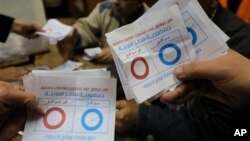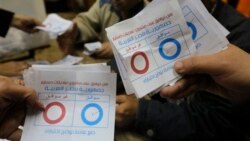Egyptians recently went to the polls, passing a constitutional referendum. The interim government announced that it had passed with 98.1 percent of the vote, but turnout was less than 40 percent. In a statement, U.S. Secretary of State John Kerry noted that this referendum was only one step in Egypt's challenging democratic transition.
"It's not one vote that determines a democracy," he said; "it's all the steps that follow" that will shape Egypt's political, economic and social framework for generations.
As Egypt's transition proceeds, the United States urges the interim Egyptian government to fully implement those rights and freedoms that are guaranteed in the new constitution and to take steps towards reconciliation.
"The brave Egyptians who stood vigil in Tahrir Square," said Secretary Kerry, "did not risk their lives in a revolution to see its historic potential squandered in the transition. . . .They still know that the path forward to an inclusive, tolerant, and civilian-led democracy will require Egypt's political leaders to make difficult compromises and seek a broad consensus on many divisive issues."
The United States has consistently expressed its serious concern about the limits on freedom of peaceful assembly and expression in Egypt, including leading up to the referendum. The United States again urges all sides to condemn and prevent violence and to move towards an inclusive political process based on the rule of law and respect for the fundamental freedoms of all Egyptians.
The preliminary assessments of Democracy International and the Carter Center underscore the challenges ahead, including Egypt’s polarized political environment, the absence of a fully inclusive process in drafting and debating the constitution ahead of the referendum, arrests of those campaigning against the constitution, and procedural violations during the referendum, such as campaigning in proximity to and inside polling stations and lack of ballot secrecy.
These concerns should be taken into account as preparations are made for presidential and parliamentary elections.
The work that began in Tahrir Square must not end there. The interim government has committed repeatedly to a transition process that expands democratic rights and leads to a civilian-led, inclusive government through free and fair elections. Now is the time to make that commitment a reality and to ensure respect for the universal human rights of all Egyptians.
"It's not one vote that determines a democracy," he said; "it's all the steps that follow" that will shape Egypt's political, economic and social framework for generations.
It's not one vote that determines a democracy," he said; "it's all the steps that follow."U.S. Secretary of State John Kerry
"The brave Egyptians who stood vigil in Tahrir Square," said Secretary Kerry, "did not risk their lives in a revolution to see its historic potential squandered in the transition. . . .They still know that the path forward to an inclusive, tolerant, and civilian-led democracy will require Egypt's political leaders to make difficult compromises and seek a broad consensus on many divisive issues."
The United States has consistently expressed its serious concern about the limits on freedom of peaceful assembly and expression in Egypt, including leading up to the referendum. The United States again urges all sides to condemn and prevent violence and to move towards an inclusive political process based on the rule of law and respect for the fundamental freedoms of all Egyptians.
The preliminary assessments of Democracy International and the Carter Center underscore the challenges ahead, including Egypt’s polarized political environment, the absence of a fully inclusive process in drafting and debating the constitution ahead of the referendum, arrests of those campaigning against the constitution, and procedural violations during the referendum, such as campaigning in proximity to and inside polling stations and lack of ballot secrecy.
These concerns should be taken into account as preparations are made for presidential and parliamentary elections.
The work that began in Tahrir Square must not end there. The interim government has committed repeatedly to a transition process that expands democratic rights and leads to a civilian-led, inclusive government through free and fair elections. Now is the time to make that commitment a reality and to ensure respect for the universal human rights of all Egyptians.






